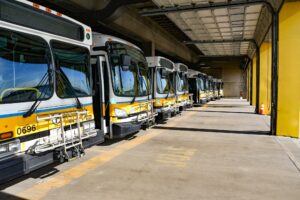The infrastructure law passed by Congress last year was in the spotlight Monday morning in Massachusetts as federal, state and local officials met up in Quincy to celebrate the billions of dollars of federal money that Massachusetts is poised to put to work on projects they hope will lead to a cleaner commonwealth.
Gov. Charlie Baker, U.S. Sen. Elizabeth Warren, U.S. Rep. Stephen Lynch, House Speaker Ron Mariano and others got together to ceremonially break ground on a future MBTA bus maintenance garage, where Warren declared that Massachusetts has “our toes on the line for transformational change right now” thanks to the money the law will send to Massachusetts to fix potholes, pave streets and make “bold and visionary” investments in areas like public transportation.
About $9.5 billion in formula funding is headed the Bay State’s way over the next five or six years as part of last year’s federal infrastructure package, Baker said Monday — including $5.4 billion for roads and bridges, $2.2 billion for public transportation and $1.3 billion for environmental infrastructure. By using the money to accommodate the pivot to more environmentally friendly public transportation, the governor said, it can have an even greater impact.
“The good news for us is not just this particular facility today but the statement it makes about where we’ll be going and how we’ll be moving and moving people over the course of the next decade or so,” Baker said Monday morning, adding that the T’s transition away from diesel and other fossil fuels in favor of an entirely electric fleet “is, for all of us here in the commonwealth, a very good story and very good news.”
The state has long acknowledged that it has a ton of catching up to do at the MBTA as well. In 2019, T officials estimated that it would cost $10.1 billion to replace all outdated equipment and infrastructure across the MBTA system.
MBTA General Manager Steve Poftak said Monday that $1.6 billion of the $2.2 billion that the federal infrastructure law will deliver to the T over the next five years has already been programmed and that another $580 million will be dedicated to new projects.
Poftak said replacing the 104-year-old Quincy bus maintenance facility with “a completely modern state-of-the-art facility” and “the first garage in our system to accommodate a fleet of zero-emission battery and battery electric buses” is a key but early step in the MBTA’s modernization. In order to update its bus fleet to be more environmentally friendly, the T needs to overhaul facilities like the one in Quincy and its Arborway garage, which is next on the list to be replaced.
The new Quincy facility will allow the T to accommodate hybrid and battery-powered buses and expand its capacity from 86 vehicles to 120 vehicles. The old garage could only accommodate vehicles that entered service before 2010 as of 2020. The work is expected to be complete by 2024.
Quincy Mayor Tom Koch said the new garage and the electric buses that will operate out of it will also represent an improvement in quality of life for his city’s residents.
“I think about driving Hancock Street in the summer day when it’s 90 degrees and there’s a bus in front of you spewing diesel fumes and your ventilation system’s sucking it into the car and how disgusting it is,” Koch said. “This is going to completely change that experience on Hancock Street and so many streets in Quincy, the South Shore and across the commonwealth.”
On top of the formula funds, even more federal money will be available through competitive grants, which elected officials and advocates have said represents a golden opportunity to kickstart momentum on long-discussed projects and tackle weighty issues like climate change and geographic equity.
“We’ve always done really well in making sure we get our fair share so-called of competitive grant and competitive bid opportunities,” Baker said. “I have no doubt that will continue to be the story as we go forward because we have a really good team on the field and we have terrific partners at the federal level.”
The Baker administration is also expected “in the coming weeks” to file a transportation bond bill with the legislature to secure the state-level commitments that are often required to be in place before the federal government will agree to fund some or all of a project. Transportation Secretary Jamey Tesler said Monday the bond bill “anticipates the needs and critical investments that will require state match.”







